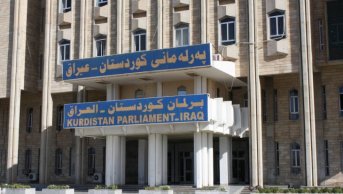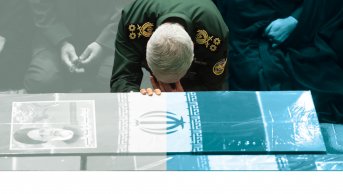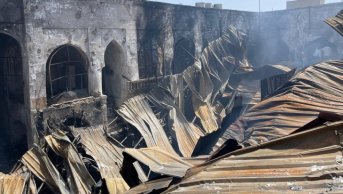Does Oil Split Iraq? Oil-Related Relationship between Turkey and the KRG

On the 10-year anniversary of the invasion of Iraq, the past decade is reviewed in many aspects. Nobody, nor any state, has doubts anymore about the fact of how wrong the US was for invading Iraq.
However, the issue that has been discussed for some years now is not the invasion itself, but the post-invasion instability and fragility of the system. The question asked frequently during the first few years of the invasion, especially between 2005-2008, when the country suffered from a major civil war -- Will Iraq maintain its territorial integrity? -- has not been asked much in recent days.
Nevertheless, it seems that the common opinion of all analysts who have been closely following the country is that the political stability of the country is on a knife-edge. It should be admitted that the national unity government that emerged as a result of the 2010 Iraqi elections was dysfunctional, and that the struggle within the government brought the Iraqi political system to a deadlock. Prime Minister Nouri al-Maliki has been striving to reinforce the central government for the last two years.
However, this effort sometimes encounters the obstacle of Iraqi Kurds’ striving to protect their rights they acquired in the 2005 Constitution, and other times the obstacle of Sunni Arabs striving to establish federalism in their region, which they had been opposed to in the past. Recently, issues related to Iraq that have topped Turkey’s agenda include generally the conflict between Arbil and Baghdad, the dispute between Maliki and Barzani, Sunni-Shiite disagreement and the relations between Turkey and Iraq. For some reason, the oil developments in Iraq, which is alleged to have the second largest oil reserves in the world, come to the fore only within the framework of their commercial value. However, until some years ago, oil in Iraq was considered key in terms of the territorial integrity of the country.
Oil and Iraq’s territorial integrity
For that very reason, ORSAM has been conducting studies for over a year to prepare a report that covers the oil industry in the territory of the Kurdistan Regional Government (KRG), the national and international dimension of the industry, assessments of internal and external actors within this framework and the role of Turkey in the issue. We are going to publish the resulting report soon, but we thought it might be good to give some reminders about the recent developments on the oil dispute in Iraq and about Turkey’s approach towards Iraqi oil. We can group those notes under four main headings:
1. Oil is a key factor in both the integrity and division of Iraq.
This statement not only defines a historical vision, but has also been one of Turkey’s main approaches to the restructuring of Iraq for some time. It has been argued for long that oil is the wealth of the entire Iraqi people, and that it is the guarantee of both the political and territorial integrity of the country. As is known, oil is not equally distributed across Iraq. While there is more oil in certain areas, there is none or scarcely any in others. If the oil-rich provinces of Iraq were to declare themselves as federal districts, or establish a federal district by joining forces, and if they drilled their oil through independent agreements like the KRG is pursuing and sold them to international markets, then how would it be possible to maintain the territorial integrity of Iraq?
The answer to this question is critical for the whole of Iraq. Since the establishment of the Iraqi state, oil has been a strategic wealth managed by a centralized government both rightly and wrongly. If administrative or political regions or any the groups the country comprises use the aforesaid wealth in line with their own interests, both the independence and integrity of the country could be put in jeopardy.
2. The activities of giant international oil companies damage the integrity of Iraq. Small companies pave the way for the activities of large companies.
Shortly before the invasion of Iraq, certain foreign companies, some of which were private Turkish firms, i.e., Genel Energy and Petoil, launched oil exploration projects in northern Iraq. In this region, only small and medium-sized enterprises were carrying out operations for a long time. It does not seem like just a coincidence then that, only a month before the withdrawal of the U.S. troops, Exxon Mobil, the largest US-based oil company in the world, signed an agreement with the KRG independent of the Iraqi government in oil fields located in disputed territories. Hence, estimations were made that the country could be dragged into chaos and to the verge of a split sometime after the withdrawal of US troops from Iraq.
Therefore, the KRG’s contracts with international oil companies might be a sign that those companies have also begun to believe that the region is splitting. It should be questioned how companies which had previously shied from signing agreements with the KRG due to the profits they were gaining from large oil fields in southern Iraq suddenly changed their minds. Moreover, not only American but also Russian, French and Chinese companies made the same move. The small companies paved the way for the necessary infrastructure for those companies and when the large companies arrived, they started to sell their shares to those companies. All these developments indicate that oil sharing in northern Iraq will become harder very soon and attain a political dimension.
3. For Turkey, staying away from the energy developments in Iraq is one thing, and being careful while being included in them is something else.
It cannot be expected from Turkey, which has a growing economy and whose energy need is increasing with each passing day, to keep its distance from the energy developments in Iraq. In fact, for this very reason, Iraqi authorities were seriously mistaken in trying to keep Turkey away from the energy developments in the country. It is quite normal for Turkey to pursue more active energy policies in Iraq, both through importing oil and natural gas from Iraq and also through Turkish energy companies’ increasing their activities there. As a matter of fact, within this framework, Turkey cannot be expected to hold itself back from the energy developments in northern Iraq. However, at the same time, taking part in initiatives that the Iraqi central government declared illegal damages the energy interests of Turkey in Iraq.
4. Being deceived by companies in northern Iraq would damage Turkey’s strategic interests in the long run.
There are important problems between the central government in Iraq and the KRG, such as authority sharing; the scope, meaning and implementation of federalism; the administrative status of some provinces; and their commitments to democracy. It is a quite important mission for Turkey, as Iraq’s neighbor, to solve the conflicts between Arbil and Baghdad before they turn into a crisis. However, certain developments that have taken place recently have damaged the interests of Turkey in Iraq. If Turkey still defines its priorities in Iraq as maintaining the territorial integrity and political unity of the country, then engaging in energy-related partnerships that the central government completely opposes conflicts with the aforesaid priorities. This assumption has four dimensions:
First of all, unfortunately, an oil law has not yet been enacted in Iraq. The lack of such a law is a result of the political problems in the country and the friction of views between the parties. This friction prevents establishing stability in Iraq. However, no matter what the reason is, it is necessary for the Iraqi people themselves to solve the problems in the country. While Iraq does not have an oil law, the fact that Turkey acted in line with the oil law of the KRG comes to mean that Turkey explicitly acts in favor of one of the parties in a political struggle and power balance in Iraq. No matter who controls the central government, this situation creates a conflict between Turkey and central Iraqi political parties in the long term.
Second, the oil issue in Iraq should not be assessed only in economic terms. It should not be forgotten that the fields on which the KRG signed an oil agreement with Exxon Mobil are a particular part of the constitutional dispute in Iraq. The KRG has established de facto dominance in some parts of the “disputed territories,” including Kirkuk, a development that is one of the most important unsolved problems in Iraq. The final status of those areas can be designated only through solving the dispute cited in Article 140 of the Iraqi constitution.
Nevertheless, the KRG today signs agreements with international oil companies by assuming that the energy fields located in some parts of those areas are under its own authority. This means solving the political problems in Iraq by including energy actors in the issue. Depending on the results of such conflicts (the production and sale to international markets has not yet started from those fields), Turkey will allow the oil that is produced reach international markets independent from the authorization of Iraqi central government. This could lead to a more complicated situation in regions like Mosul and Kirkuk. That scenario would conflict with the policy that Turkey, which considers Kirkuk the most fragile province post-US invasion and which asserts that the status of this city would be determinant for the stability of Iraq, has been following so far.
As for the third factor, by signing independent agreements with the KRG and facilitating the region’s oil production and trade, Turkey may pave the way for the independence of northern Iraq. In general, unlike what is reflected in the press, some of the oil produced in the territory of the KRG goes completely to the KRG administration as its own independent income. Under normal circumstances, like the rest of Iraq, the oil produced in the region should be sent to an account under the control of Baghdad and be included in the budget there. In the ongoing system, 17 percent of budget income must be transferred to the KRG. Baghdad has violated this agreement by sending less than this amount to the KRG.
However, the solution to this problem is not to bring what is not sent to Arbil by Baghdad to Arbil through Turkey, but to make the Iraqi central government keep its promises to maintain the stability of the country. Nevertheless, it is known that today some companies, including Genel Energy, sell the oil they produce to the domestic market in Iraqi Kurdistan at low prices. Recently, some of this oil has begun to be sold to international markets through Turkey. The income earned from the oil sales goes directly to the KRG, not to the Iraqi central government. It has always been argued in Turkey that if the KRG were to maintain an independent oil income, this would pave the way for the independence of the region. To sum up, the KRG’s independent oil income is one of the most important developments in the path towards an independent Kurdish state in Iraq. At this point, the decision Turkey must make should consider not only its own energy needs, but the needs of the region and the entire country of Iraq on a much larger scale.
Concerning the fourth factor, the internal dynamics of the Iraqi Kurds, should be taken into consideration. Today, many political parties and prominent leaders within the KRG argue that the oil agreements of the current regime are not transparent and are corrupt in various ways. It should be important for Turkey that those criticisms are made not only by the Gorran Movement for Change, the Kurdistan Islamic Union and other Iraqi opposition parties, but also by leaders including high-level partners of the government in power.
It is hard to estimate the results of the parliamentary and presidential elections to be held in northern Iraq this year. Although many analysts assert that a big surprise is not to be expected, the Patriotic Union of Kurdistan (PUK), which is currently considered the weakest actor, has been defining the future of political balances in the region. In other words, engaging in energy partnerships with Iraqi Kurds, the majority of which it has strong doubts over, might cause a problem down the road in terms of Turkey’s relations with the group.






